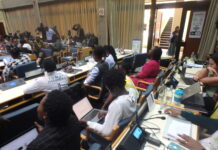By Winnie Kamau
Nairobi, Kenya: A report recently released has shown that some of the Women-led Businesses (WLBs) decried of sexualization of tenders and sexual harassment in the delivery of open contracts. The demand for bribes or unaccounted payments is normalized with several women being forced to tough choices especially when some unethical officers or their proxies demand sexual favors in exchange for tenders.
A famous phrase that is commonly quoted by procurement agents, mostly men usually say “Use what you have to get what you want” said one businesswoman.
The report shows that many of the access to Open Contracts through the Government Procurement Opportunities (AGPO) groups would benefit from tenders in higher frequency but low values. The majority of the AGPO women enlisted for the general supplies category including office stationery, furniture and fittings, and other operations support goods and professional services and consultancies. There were few women in technology supplies such as ICT software and equipment comparatively.
“Women go for small-sized contracts and values such as cleaning, printing, and stationery services whose profit margins are small. Others who are lucky would land contracts for works to do maintenance works, and refurbishments but not the main works. Established businesses are usually given preference over start-up firms. This is a common problem that cuts across all fields because of need of experience” explains a Public Procurement Regulatory Authority (PPRA) staff member who asked for anonymity.
The report by The Institute of Social Accountability (TISA) in partnership with Africa Freedom of Information Centre (AFIC) and Open Contracting Partnership (OCP) dubbed ‘Understanding the Barriers and Solutions to Include Women-Led Businesses in Kenya’.

Another serious emerging trend is the challenge of conflict of interest especially in the Counties where public officials have registered firms exploiting women, youth, and Persons With disabilities (PWDs).
Non-responsiveness in regards to the procurement under AGPO and payment delays after completion of contractual obligations and numerous allegations of rampant corruption.
“People are called and awarded contracts over the phone. Those credible and have no government connections cannot access any tenders on their contracts” lamented a businesswoman from Isiolo.
The study shows that about 89% of the WLB respondents acknowledged payment of bribes to win contracts and 42% of WLBs indicated being coerced or pressured to provide sexual or other favors to win contracts while 41% of them said they witnessed persons sacrificing part of their contract value to win the tenders and more so to get paid after delivery.
“I was verbally informed that my bid had won and that to secure the contract; I was to make some ‘facilitation’ payment. I never understood this clearly. Then when I went to the office that called me, they said they were not aware of such a thing. After some time a lady I know was given the tender I had bid for and really wondered how things would go” explained a Businesswoman from Trans Nzoia.
Presidential Executive Order Number 2 of 2018 issued by Former President Uhuru Kenyatta introduced a Beneficial Ownership Information requirement for companies registered in Kenya and both the Registrar of Companies and the PPRA did firm up regulations to comply with the order. Beneficial Ownership spells out who the beneficiaries of a business entity or company are.
The Presidential Order number 2 is in line with Open contracting standards a guide for PPRA which is about publishing and using open, accessible and timely information on public contracting to engage citizens and businesses to fix problems and deliver results.
One successful businesswoman said that there is transparency up to where the tenders are opened and you are aware of the firms that bid. The problem is when the evaluation committee retreats to do a bid evaluation. She says cases of corruption are isolated “It depends on how one presents themselves”.
While another unsuccessful businesswoman decried the statement noting “I have submitted tenders to various county departments. I have been bidding since 2017 but later end up in vain by just being locked out at the shortlisting stage. The major challenge we face is corruption at almost every level of procurement processes. The County procurement officials insist on negotiating a proportion of the tender value. The second major challenge is the self-interest among the county officers, they give tenders to their close relatives including wives, sisters, mothers, and cousins” explained a businesswoman from Kisumu.
The PPRA representative presented a gendered perspective of corruption defending Women-led businesses “Women are more ethical than their male counterparts. However, corruption is two-sided and has both the giver and taker. For men, it is like they are making territory through informal incentives to attract favor whereas this culture is not rooted in women. Additionally, most women would not have the luxury to extend such niceties to representatives or agents of procuring entities.”
According to the report by AFIC and TISA shows that in 2021, the renders awarded to special categories had hit Kshs. 26 billion (260 Million USD). These were mainly tenders drawn from Ministries, departments, and semi-autonomous government agencies (SAGAs) which were awarded to the youth, women, and PWDs. The report shows the value of the AGPO tenders increased from Kshs. 22.81 billion (228 Million USD) in the 2019/20 Financial year to Kshs. 26.47 billion (264.7 Million USD) in the financial year of 2020/21.
Registration of Kenyan businesses did drop last year if we go by the data from the Registrar of Companies (BRS). In the Financial year 2020/21 there were 154,155 registered businesses compared to the financial year 2021/22 where 107,277 businesses were registered.
The Access to Government Procurement Opportunities (AGPO) program was launched on 16th October 2013 to allow ease of access for Women, Youth, and People with Disabilities (PwDs) to access 30% of all Government Procurement contracts.














